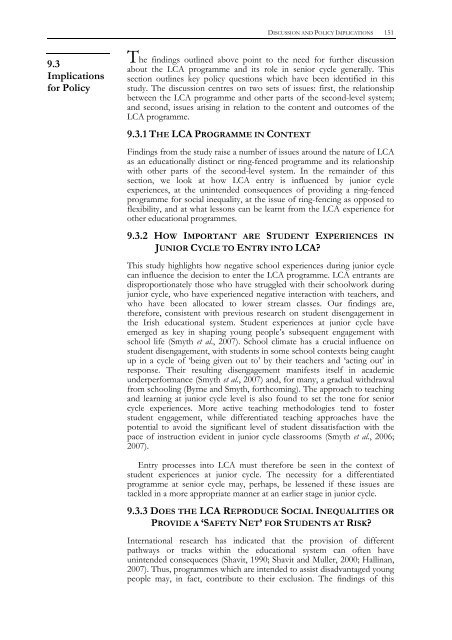Student Experiences of the Leaving Certificate Applied Programme
Student Experiences of the Leaving Certificate Applied Programme
Student Experiences of the Leaving Certificate Applied Programme
You also want an ePaper? Increase the reach of your titles
YUMPU automatically turns print PDFs into web optimized ePapers that Google loves.
DISCUSSION AND POLICY IMPLICATIONS 1519.3Implicationsfor PolicyThe findings outlined above point to <strong>the</strong> need for fur<strong>the</strong>r discussionabout <strong>the</strong> LCA programme and its role in senior cycle generally. Thissection outlines key policy questions which have been identified in thisstudy. The discussion centres on two sets <strong>of</strong> issues: first, <strong>the</strong> relationshipbetween <strong>the</strong> LCA programme and o<strong>the</strong>r parts <strong>of</strong> <strong>the</strong> second-level system;and second, issues arising in relation to <strong>the</strong> content and outcomes <strong>of</strong> <strong>the</strong>LCA programme.9.3.1 THE LCA PROGRAMME IN CONTEXTFindings from <strong>the</strong> study raise a number <strong>of</strong> issues around <strong>the</strong> nature <strong>of</strong> LCAas an educationally distinct or ring-fenced programme and its relationshipwith o<strong>the</strong>r parts <strong>of</strong> <strong>the</strong> second-level system. In <strong>the</strong> remainder <strong>of</strong> thissection, we look at how LCA entry is influenced by junior cycleexperiences, at <strong>the</strong> unintended consequences <strong>of</strong> providing a ring-fencedprogramme for social inequality, at <strong>the</strong> issue <strong>of</strong> ring-fencing as opposed t<strong>of</strong>lexibility, and at what lessons can be learnt from <strong>the</strong> LCA experience foro<strong>the</strong>r educational programmes.9.3.2 HOW IMPORTANT ARE STUDENT EXPERIENCES INJUNIOR CYCLE TO ENTRY INTO LCA?This study highlights how negative school experiences during junior cyclecan influence <strong>the</strong> decision to enter <strong>the</strong> LCA programme. LCA entrants aredisproportionately those who have struggled with <strong>the</strong>ir schoolwork duringjunior cycle, who have experienced negative interaction with teachers, andwho have been allocated to lower stream classes. Our findings are,<strong>the</strong>refore, consistent with previous research on student disengagement in<strong>the</strong> Irish educational system. <strong>Student</strong> experiences at junior cycle haveemerged as key in shaping young people’s subsequent engagement withschool life (Smyth et al., 2007). School climate has a crucial influence onstudent disengagement, with students in some school contexts being caughtup in a cycle <strong>of</strong> ‘being given out to’ by <strong>the</strong>ir teachers and ‘acting out’ inresponse. Their resulting disengagement manifests itself in academicunderperformance (Smyth et al., 2007) and, for many, a gradual withdrawalfrom schooling (Byrne and Smyth, forthcoming). The approach to teachingand learning at junior cycle level is also found to set <strong>the</strong> tone for seniorcycle experiences. More active teaching methodologies tend to fosterstudent engagement, while differentiated teaching approaches have <strong>the</strong>potential to avoid <strong>the</strong> significant level <strong>of</strong> student dissatisfaction with <strong>the</strong>pace <strong>of</strong> instruction evident in junior cycle classrooms (Smyth et al., 2006;2007).Entry processes into LCA must <strong>the</strong>refore be seen in <strong>the</strong> context <strong>of</strong>student experiences at junior cycle. The necessity for a differentiatedprogramme at senior cycle may, perhaps, be lessened if <strong>the</strong>se issues aretackled in a more appropriate manner at an earlier stage in junior cycle.9.3.3 DOES THE LCA REPRODUCE SOCIAL INEQUALITIES ORPROVIDE A ‘SAFETY NET’ FOR STUDENTS AT RISK?International research has indicated that <strong>the</strong> provision <strong>of</strong> differentpathways or tracks within <strong>the</strong> educational system can <strong>of</strong>ten haveunintended consequences (Shavit, 1990; Shavit and Muller, 2000; Hallinan,2007). Thus, programmes which are intended to assist disadvantaged youngpeople may, in fact, contribute to <strong>the</strong>ir exclusion. The findings <strong>of</strong> this

















